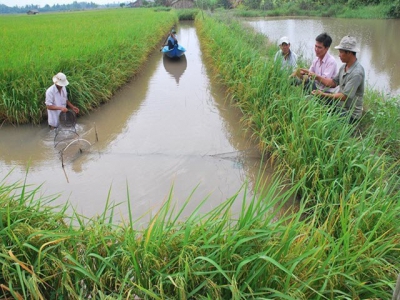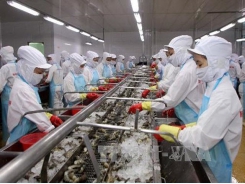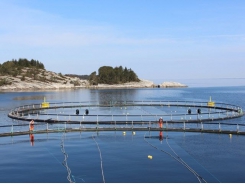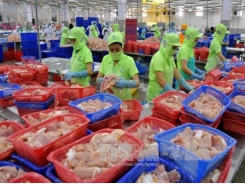Mekong Delta promotes eco-shrimp farming

A field in the Mekong Delta province of Bạc Liêu. Eco-shrimp farming helps generate economic profits and lessens harm to the environment. — VNA/VNS Photo Huỳnh Sử
MEKONG DELTA — Eco-shrimp farming, which has been spreading in Mekong Delta provinces in recent years, is touted as a model for sustainable aquaculture development thanks to its strengths in environmental protection, low costs, and high profit.
Đinh Xuân Lập, deputy director of the International Collaboration Centre for Aquaculture and Fisheries Sustainability said that the eco-shrimp farming model created jobs for more than 700,000 labourers in the Mekong Delta.
Eco farming refers to the practice of raising shrimps in rice fields or mangrove forests at low density. Compared to industrial shrimp cultivation, farmers do not have to pay much for feeds, wastewater treatment systems or medicine to treat diseases. Eco farming also requires less labour.
“Each kilo of shrimp raised under this model is about VNĐ20,000-30,000 (US$0.86-1.3) more expensive than one kilo of industrial shrimp while the production cost is just half that of industrial farming methods,” Lập said.
Shrimp farmer Võ Hồng Ngoãn from the Mekong Delta Province of Bạc Liêu said that at his eco-shirmp farm, he bred 7-9 shrimps per cubic metre of water surface instead of 30-40 shrimps at an industrial farm.
“The feed for the shrimp is available in the water. I don’t have to buy feed,” he said, adding that the water was not contaminated because of shrimp waste and redundant feed.
Chairman of the province People’s Committee, Dương Thành Trung, said that as of May, 2018, the province housed more than 120,000 hectares of water surface used for eco-shrimp farming, and improved extensive shrimp farming.
He said the province will promote the application of advanced technologies in eco-shrimp cultivation, adding that the model allows local farmers to easily control diseases, prevent pollution in farming areas, and ensure the living environment for both the shrimp and farmers. However, according to experts, to ensure the sustainable expansion of eco-shrimp farming, there should be close connection between production and marketing processes.
Lê Văn Sử, deputy chairman of Cà Mau Province People’s Committee, said that about 90,000 ha of mangrove forest and coastal protection forest in the province were used for eco-shrimp farming.
The province attempted to connect food companies with shrimp farmers to ensure stable incomes for farmer while the companies could help them improve farming techniques, Sử said.
Farmers who joined the production chain could sell their shrimp at higher prices than those who did not, Sử said, adding that the incentive effectively engaged farmers into supply-consumption chain.
Chairman of Cà Mau-based Minh Phú Group Lê Văn Quang said that Vietnamese eco-shrimp products were granted certifications by prestigious orgasisations, and were shipped to more than 160 countries across five continents.
Eco-farming offered favourable conditions for shrimp growth and eco-farms did not harm the environment of surrounding areas, Quang said.
He also emphasised the need to develop branding for Vietnamese shrimp.
Improved production lines, farming techniques, closer co-operation between farmers and companies as well as applying for international certifications were among necessary activities, he said.
Minister of Agriculture and Rural Development Nguyễn Xuân Cường stated that localities had to draw up strict shrimp farming management processes, from breeding production, supply to processing, so as to enhance competitive capacity for Vietnamese shrimp.
The Vietnam Directorate of Fisheries’ 2017 statistics said the total production of shrimp weighed at 704,868 tonnes, of which export turnover reached over US$3.85 billion, up by 22.3 per cent from the end of 2016.
According to experts, Việt Nam’s shrimp industry is expected to gain an export value of US$4.8 billion in 2018 due to the many advantages of export promotion.
According to a national action plan on the development of the shrimp industry by 2025, shrimp farming will be developed into a key industry that is environmentally friendly and can withstand the challenges of climate change.
The plan aims to improve the quality and efficiency of production and competitiveness of Vietnamese shrimp products to bring higher benefits to farmers, businesses and the national economy.
The domestic shrimp industry is expected to earn US$5.5 billion in export value and record an annual average growth of 10.79 per cent in the three years to come, including US$4.5 billion from brackish water shrimp exports.
In the 2021-25 period, a hi-tech shrimp industry and large-sized eco-shrimp farming area will be built. Infrastructure and technical services will be provided in a comprehensive, efficient and sustainable manner. The shrimp industry will reach US$10 billion in export value and record an annual growth of 12.7 per cent.
The plan also stresses that the industry must take full advantage of natural conditions, market, processing technology and experts’ experience to gain efficient and sustainable development.
The industry also plans to develop large-scale production areas and use hi-tech and environmentally friendly scientific achievements to increase productivity and product quality. The use of chemicals and antibiotics in all aquaculture modes and stages of processing and circulation of shrimp products will gradually be phased out
Có thể bạn quan tâm
Phần mềm

Phối trộn thức ăn chăn nuôi

Pha dung dịch thủy canh

Định mức cho tôm ăn

Phối trộn phân bón NPK

Xác định tỷ lệ tôm sống

Chuyển đổi đơn vị phân bón

Xác định công suất sục khí

Chuyển đổi đơn vị tôm

Tính diện tích nhà kính

Tính thể tích ao hồ




 Vietnam eyes stronger export of aquatic products to…
Vietnam eyes stronger export of aquatic products to…  Việt Nam to promote seafood exports to Brazil
Việt Nam to promote seafood exports to Brazil